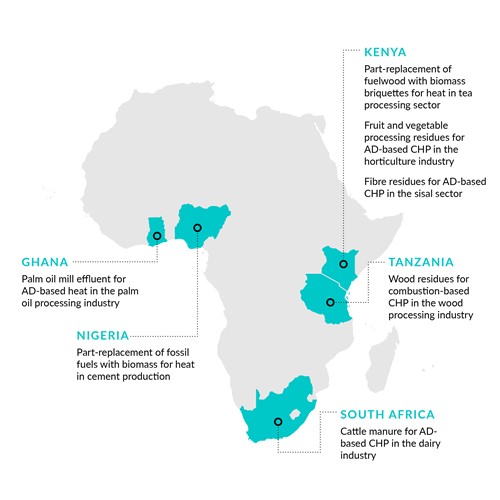News
Market assessment reports and supporting toolbox launched to advance bioenergy development in Africa

TANWAT CHP plant. Photo by Emmanuel Michael Biririza
News
TANWAT CHP plant. Photo by Emmanuel Michael Biririza
NIRAS-LTS’s research programme ‘Bioenergy for Sustainable Local Energy Services and Energy Access in Africa’ (BSEAA2), supported by UK aid via the Transforming Energy Access programme, has launched a series of technical reports, policy briefs, economic and resource assessment toolkits, and databases (of bioenergy projects and technology providers) to guide investors, project developers and policy makers to advance bioenergy development in Africa.
Sub-Saharan Africa has a huge variety of bioenergy feedstocks with an enormous potential to meet Africa’s burgeoning demand for modern energy services. However, bioenergy development has been extremely constrained with a low success rate of commercial deployment in Africa. While the common barriers to wider adoption of bioenergy in Africa are well-known, a more comprehensive understanding of the requirements and opportunities for catalysing bioenergy development in sub-Saharan Africa is still largely missing.
BSEAA Phase 2 was therefore designed as an applied research programme aimed at generating evidence-based analysis, practical resources and tools to assist entrepreneurs, investors and policymakers in assessing the feasibility and application of bioenergy to catalyse action for the further development of commercial-scale bioenergy in the region.

In collaboration with Aston University, Aiguasol and E4tech, NIRAS-LTS undertook a comprehensive assessment of challenges and opportunities for the commercial deployment of anaerobic digestion (AD) and combustion-based technologies for either electricity, heat or combined heat and power (CHP) (10 kWe to 5 MWe), across ten target countries (Kenya, Ethiopia, Tanzania, Uganda, Rwanda, South Africa, Mozambique, Zambia, Ghana and Nigeria). An analysis of commercial experiences based on bioenergy projects deployed across the target countries led to the prioritisation of seven promising demand sectors with proven potential for growth.

Comprehensive research across these seven demand sectors was undertaken through six inter-linked themes of biomass resources, technology, economic competitiveness, commercial viability, institutional, market and regulatory frameworks, and gender and inclusion (G&I). Detailed reports for each demand sector highlight the constraints and opportunities for bioenergy development. A summary report distils the key findings and conclusions, and charts a way forward. Seven accompanying policy briefs highlight relevant regulatory and market conditions, and measures required to catalyse further adoption of commercial-scale bioenergy in sub-Saharan Africa (SSA).
Practical tools will help investors, policy makers and project developers considering planning and investment in AD or combustion-based bioenergy projects in sub-Saharan Africa, make decisions regarding the feasibility of the proposed investments. These tools include a) Life-Cycle Cost Assessment tool; b) Mass Energy Balance tool; c) Database of bioenergy projects in sub-Saharan Africa; and d) Database of prominent technology providers with verified experience of working in sub-Saharan Africa.
Register here for the BSEAA2 project's final online event 'Realising bioenergy's potential to help address energy challenges in SSA' on 22nd September 2021 (11:00-12.30 BST)
Project report and supporting research

